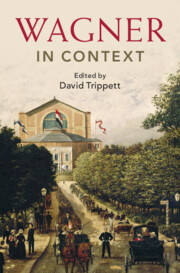Book contents
- Wagner in Context
- Composers in Context
- Wagner in Context
- Copyright page
- Contents
- Illustrations
- Musical Examples
- Contributors
- Acknowledgements
- Abbreviations
- Introduction
- I Place
- II People
- III Politics, Ideas, and Bodies
- IV Life, Language, and the Ancient World
- V Music and Performance
- VI Reception
- Further Reading
- Select Bibliography
- Index
Introduction
Published online by Cambridge University Press: 14 March 2024
- Wagner in Context
- Composers in Context
- Wagner in Context
- Copyright page
- Contents
- Illustrations
- Musical Examples
- Contributors
- Acknowledgements
- Abbreviations
- Introduction
- I Place
- II People
- III Politics, Ideas, and Bodies
- IV Life, Language, and the Ancient World
- V Music and Performance
- VI Reception
- Further Reading
- Select Bibliography
- Index
Summary
If histories of Western music were written according to individual influence, Richard Wagner might be taken as the context against which all others can be defined. Such is the breadth of his presence in nineteenth-century studies. Friedrich Nietzsche called him ‘the bad conscience of his time’, while Thomas Mann put it in microcosm in 1933: ‘Steeped in sorrows and grandeur, like the nineteenth century he so perfectly epitomizes – thus does the intellectual figure of Richard Wagner appear to me.’ So opens Mann’s most influential essay on the composer. One would be forgiven for assuming, like Mann, that to map the various contexts of Wagner in 2023 is tantamount to mapping the cultural and intellectual riches of a version of nineteenth-century Europe itself, with the world on its fringes. From Gilgamesh to spa culture, Aeschylus to blood alcohol measurement, horn resonance to Sanskrit poetry – the potential array defies coherence, raising the question of whether it is really Wagner’s historical persona making encyclopaedic claims (via the unity we ascribe to his subjectivity) or the legions of writers who have woven, and continue to weave, his reception history.
- Type
- Chapter
- Information
- Wagner in Context , pp. 1 - 8Publisher: Cambridge University PressPrint publication year: 2024

